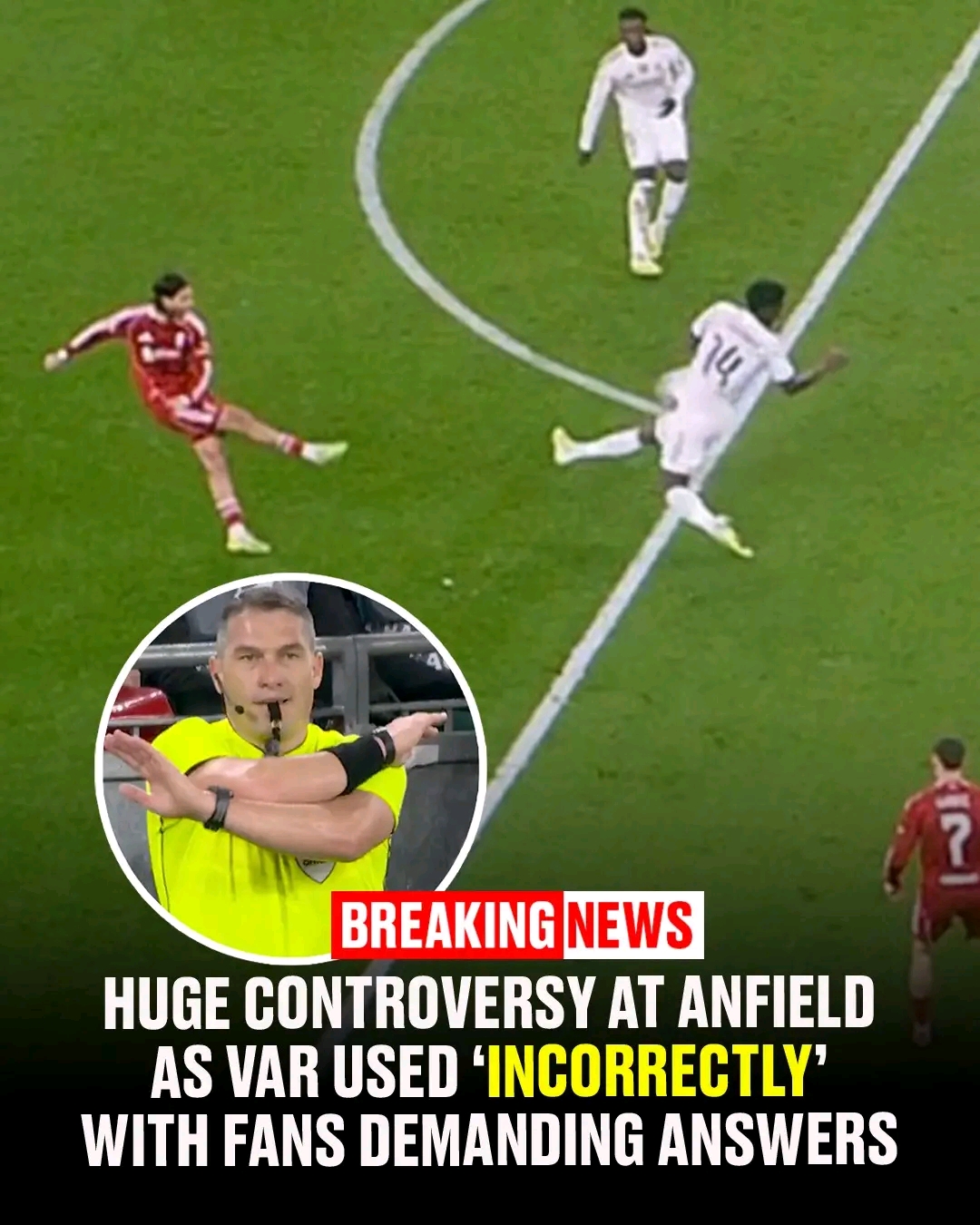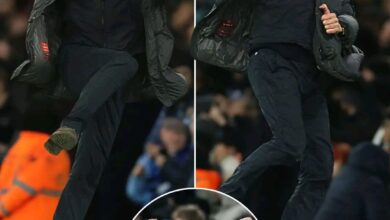Liverpool vs Real Madrid VAR Incident Causes Outrage as Fans Make Same Point

The night was supposed to be about football, passion, and history. Liverpool versus Real Madrid — two European giants meeting again under the Anfield lights. The air was electric, every fan inside the stadium holding their breath for another unforgettable night. But what happened in the 30th minute changed everything. It wasn’t a goal. It wasn’t a red card. It was a decision — one made not by the players, not by the referee’s instinct, but by a screen. And that one decision sent the entire football world into a storm of disbelief, anger, and outrage.
Liverpool were in control. The game had opened up beautifully, with Dominik Szoboszlai and Alexis Mac Allister running the show in midfield. Every touch from Wirtz was greeted with applause, every run from Ekitike was full of purpose. Real Madrid looked uncomfortable. The energy inside Anfield was growing louder, the Kop singing louder and louder, waiting for the breakthrough. And then, in the 30th minute, it came — or at least, it was supposed to.
Szoboszlai found a little space outside the Real Madrid box. He looked up, saw a gap, and struck the ball with power. It smashed straight into the arm of Aurelien Tchouameni, who was standing just outside the area. The ball clearly changed direction, and the Liverpool players immediately raised their arms, shouting for a free-kick — maybe even a penalty. The referee, Istvan Kovacs, blew his whistle. The crowd roared. It looked like Liverpool had a golden chance in a dangerous position. But then VAR got involved, and the chaos began.
At first, the big screen showed the referee making the signal — checking for a possible penalty. Everyone assumed it was to see whether the handball was inside or outside the box. That’s normal in football now. But what came next was something no one had ever seen before.
Kovacs walked over to the monitor on the touchline. The cameras zoomed in. He watched the replay again and again — Szoboszlai’s shot, Tchouameni’s arm, the distance, the movement. It was clear the ball had hit his hand. The only question was where. Fans inside Anfield were tense but hopeful. Then, after what felt like forever, Kovacs turned back toward the pitch. Everyone waited for the signal. Penalty or free-kick — either way, Liverpool were ready to attack.
But instead, Kovacs shocked the entire world. He overturned his own decision completely. No free-kick. No penalty. Nothing. He gave a drop ball to Real Madrid.
For a few seconds, there was complete silence. Nobody understood what was happening. Even the players looked confused. Szoboszlai threw his arms in the air. Van Dijk walked toward the referee, shouting for an explanation. Mac Allister looked at the assistant in disbelief. Arne Slot stood on the touchline, hands on his head. The crowd erupted in fury. The chants turned from excitement to rage.
“What is this?!” screamed one fan near the camera. “He gave a free kick, went to check for a penalty, and then took the free kick away? When has that ever happened in football?”
Social media exploded instantly. Within minutes, X (Twitter) was full of angry fans, pundits, and even former referees trying to understand the madness. One fan wrote, “Bruv, he gave a free kick and went to do a penalty check then overturned the free kick????? When has VAR ever just overturned a free kick wtf???” Another added, “Since when could VAR change free kicks? This is insane.”
It wasn’t just fans. Even the commentators were lost. Former Premier League referee Mark Clattenburg, working for Amazon Prime, said live on air that he had never seen anything like it. “I find it interesting,” he said carefully, “that the referee has been allowed to have a second opinion here. In England, that doesn’t happen. Once a free kick is given for a handball outside the box, VAR can check whether it was inside — but they can’t overturn the entire free-kick decision. That’s new to me.”
Alan Shearer, sitting beside him, shook his head. “That’s not right,” he said. “You can’t just take away a free kick completely. Either it’s a penalty or it’s not, but you can’t say nothing happened at all.”
The replay showed everything clearly. Szoboszlai’s shot hit Tchouameni’s arm. Yes, the French midfielder’s hand was close to his body, but the ball clearly struck it. Usually, in any league, that’s still a free kick. But Kovacs decided otherwise. He said Tchouameni’s arm was in a “natural position” and that he didn’t make his body bigger. So the call was cancelled.
The fans inside Anfield couldn’t believe it. “VAR is killing football!” someone shouted from the stands. Others whistled and booed loudly every time the referee touched the ball afterward. It wasn’t just about one decision. It was about the feeling that once again, Liverpool were being denied fairness on a big European night.
The anger turned to confusion as play restarted. The referee dropped the ball to Real Madrid’s goalkeeper, and the game continued like nothing had happened. But nobody could move on. The players looked distracted. Szoboszlai kept shaking his head. Even Mbappé, who was standing near the halfway line, seemed to smirk at the chaos.
A few minutes later, the chants started again. “VAR, VAR, VAR,” the crowd roared sarcastically. It was the sound of frustration that had been building in football for years. Technology was meant to make things fair. Instead, it had made fans feel helpless.
On Amazon Prime’s live broadcast, the screen showed fans’ reactions from social media. One message read: “Is that the first time a free kick has ever been overturned on VAR? What a joke.” Another said: “Ref gives a free kick for handball outside the box. VAR shows it’s inside. Ref gives a drop ball. I’ve watched football all my life — never seen that before.”
By halftime, it had become the biggest talking point of the night. Even journalists inside the stadium stopped writing about the game itself and started typing about the incident. It was like time had frozen in the 30th minute.
Mark Clattenburg tried to explain again, but even he sounded unsure. “VAR is there to correct clear and obvious errors,” he said. “But this? This is not clear. This is confusion. The referee has changed a decision that was not wrong to begin with. That’s the problem.”
In the second half, when Alexis Mac Allister finally scored the winning goal, the anger hadn’t faded. The Liverpool fans celebrated wildly, but even during the celebrations, you could still hear people shouting about the VAR moment. It became a symbol of something deeper — the feeling that football’s soul was being replaced by cold technology and inconsistent rules.
After the match, the discussion exploded again online. Fans from other clubs joined in, saying the same thing: “VAR has gone too far.” One neutral fan wrote, “I’m not even a Liverpool supporter, but what happened tonight is madness. You can’t just invent new rules in the middle of a Champions League game.”
Former players started weighing in too. Rio Ferdinand posted, “VAR has to be clearer. This kind of decision destroys trust. Fans deserve transparency.” Jamie Carragher, never one to stay quiet, tweeted, “The referee gave a free kick. VAR told him to check if it was a penalty. Somehow, he came back with neither. Football’s gone mad.”
Even Real Madrid fans looked surprised. One of their fan accounts posted, “We’ll take it, but wow — that’s one of the strangest VAR calls ever.”
Arne Slot, in his post-match interview, tried to stay calm. “I don’t want to talk too much about the decision,” he said, though his face showed frustration. “We play football to compete, to attack, to score goals. When moments like this happen, it’s difficult to understand. We have to trust the officials, but sometimes it’s hard.”
Liverpool captain Virgil van Dijk was more direct. “I don’t understand what’s going on anymore,” he said. “If that’s not handball, then what is? It hit his arm, changed the direction of the ball, and we get nothing. It’s disappointing. You feel helpless.”
Even Jurgen Klopp, who was watching from the stands, was caught on camera shaking his head and laughing in disbelief. It was the same expression he had years ago when Liverpool were denied goals for offside lines that were invisible to the naked eye.
As the night went on, the debate refused to die. Pundits around Europe started dissecting the rulebook. Could VAR overturn a free kick? Was it even legal within UEFA’s own guidelines? The confusion deepened. The more people looked, the less sense it made.
And in the middle of it all, fans kept making the same point — that football was losing its heart. “We want the human side back,” one wrote. “Mistakes are part of the game, but this isn’t a mistake — it’s madness.”
By midnight, clips of the incident had gone viral across social media. Millions watched the slow-motion replay, pausing and zooming in, each forming their own opinion. Some said it wasn’t deliberate handball. Others said it clearly was. But almost everyone agreed on one thing — the process was wrong. The system was broken.
In pubs around Liverpool, fans were still talking about it long after the final whistle. One older fan said, “Back in the day, you could argue about a ref’s mistake. You’d shout, you’d get angry, but it was human. Now? You can’t even argue with a computer. It’s taking the soul out of the game.”
That was the truth many felt deep down. The more football tried to be perfect, the less human it became.
The irony was that Liverpool still won the match. Mac Allister’s header brought joy and redemption, but even that moment of triumph couldn’t erase the frustration. People weren’t just angry because of one decision — they were angry because football no longer felt fair.
In the days that followed, UEFA quietly confirmed that Kovacs had followed protocol — technically, he was allowed to cancel the free-kick after VAR review. But even with the official explanation, the fans were not satisfied. Because sometimes, what’s allowed isn’t what’s right.
Liverpool had beaten Real Madrid, but the story of the night wasn’t the goal, the performance, or the victory. It was a single, confusing decision that showed how fragile football’s faith in fairness had become.
And so, as fans left the stadium that night, the chants of victory mixed with the sound of anger. “VAR OUT!” some shouted. Others just shook their heads, still trying to understand what they had witnessed.
Anfield, a place famous for unforgettable moments, had witnessed another one — but this time, it wasn’t for the right reasons.
The game that should have been remembered for Liverpool’s passion and revenge over Real Madrid would forever be remembered for the night VAR broke the rules of football itself.















